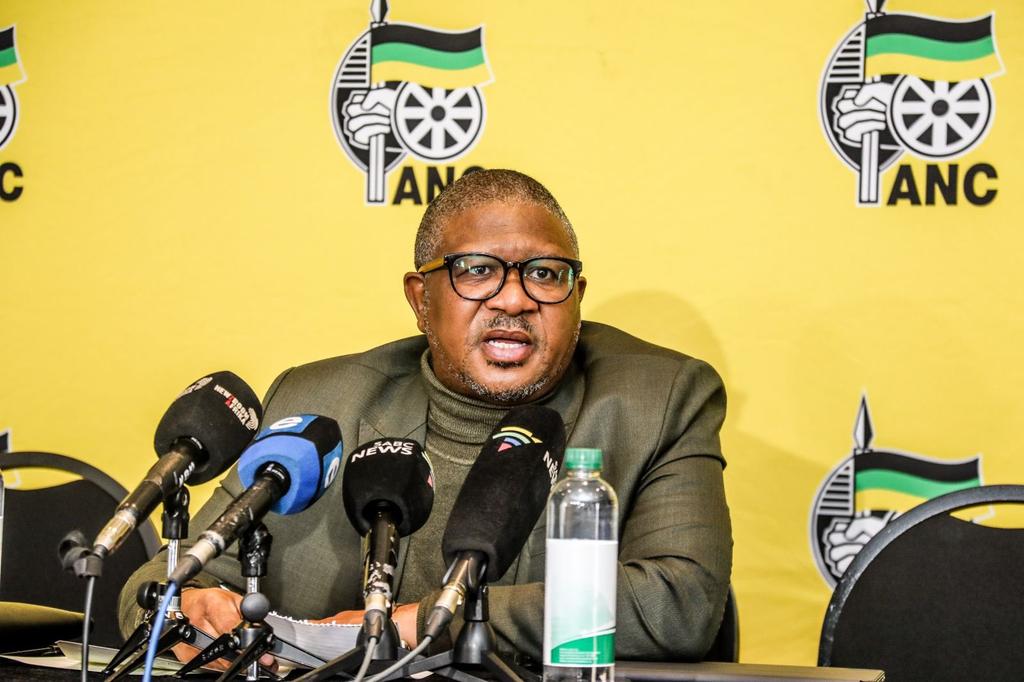PHUTI MOSOMANE
ANC Secretary-General Fikile Mbalula says the three-day National executive Committee (NEC) meeting will focus on discussions regarding potential coalition partnerships, as the party prepares for the 2024 general elections.
The three-day ANC NEC meeting will be held in Birchwood, Boksburg in Ekurhuleni. Mbalula said that there will also be discussions on the reconfiguration of the Alliance as proposed by the SA Communist Party (SACP).
“There will be discussion on the coalitions and reconfiguration of the Alliance as proposed by the SACP,” Mbalula said.
Political analyst Ebrahim Fakir raised concerns that self-interest is driving the decision-making of coalition governments, adding that there was a need for a principle-based approach centred on ensuring stability in institutions and social solidarity.
He suggested that the only sensible and logical coalition is for the ANC to work with the DA, and urged President Cyril Ramaphosa to show leadership and convince the divided ANC leaders of the best approach.
“The fact that the party is discussing this is an open concession that they are looking at other options. There are those pushing for a populist least principled approach mainly in Gauteng. This approach will be good for the ANC but very bad for society,” said Fakir.
He said those in the ANC pushing for the most convenient coalition partner like the Economic Freedom Fighters (EFF), will have to explain to the electorate why EFF leader Julius Malema was expelled from the party in the first place.
“If the argument is that the alliance with the EFF is meant to advance the black agenda, we must ask ourselves as to where this agenda was in the last 30 years. There is a need for principled guidelines on coalitions centred on ensuring stability in the institutions and ensuring social solidarity. The only sensible and logical coalition is for the ANC to work with the DA,” he said.
He said Ramaphosa must show leadership and convince a divided ANC leaders about what sensible approach the party should take.
“If indeed President Ramaphosa is a great negotiator as we all thought he is, this is his moment to show leadership. This is his test. The ANC does not matter in this case, it’s for what is good for society. If he can’t do it, then the voters should reject him in the 2024 elections,” said Fakir.
Fakir, who is with the Auwal Socio-economic Research Institute, says much of coalition negotiations are entirely based on self-serving interests.
He said that political parties are more about irregularly influencing procurement.
Bheki Stofile, the President of South African Local Government Association (SALGA), has called for transparency in how political parties formulate coalition agreements, highlighting that the lack of a framework to guide political parties in structuring and managing coalitions has resulted in coalitions being unstable or short-lived.
In November 2021, SALGA collaborated with members of executive councils and tertiary institutions to develop a Framework for Coalitions Governments and is now pushing for the framework to be promulgated.
The purpose of the framework was to determine the parameters within which coalition partners can practice their coalition politics.
Without a framework to guide political parties in structuring and managing coalitions, political parties and independent councillors are required to establish coalitions whilst being uncertain about the rules, this results in coalitions being unstable or short-lived.
“The first order of business for the coalition partners, after the conclusion of the coalition agreement, is to take communities into their confidence and publish the coalition agreement,” Stofile says.
Stofile argued that coalition agreements entered into by political parties should be made public.
“For reasons best known by coalition partners, coalition agreements have generally not been made public. It is our considered view that this may be a key contributing factor to why coalitions are so unstable,” Stofile said.
The 2021 local government election re-defined the local government political landscape as coalition governments have become a common feature across many South Africa’s municipalities.
“Publishing the coalition agreement can work in favour of coalition stability. It is no secret that, in the past, coalition partners did not hesitate to violate coalition agreements. The fact that there was no transparency surrounding coalition agreements made this easy: the public had no knowledge of the commitments made by the coalition partners so there was no fear of an electoral backlash when one of the partners opted out”, said Stofile.
“However, if the public is aware of the contents of the coalition agreement, it will be more difficult for a coalition partner to violate the agreement. The public will know that this political party or councillor reneged on a commitment it signed,” he added.
Former Gauteng Premier David Makhura is expected to present a Strategic Framework on Coalitions to the media on Saturday, while service delivery has suffered in most areas due to the instability of coalition governments.
Major metros such as Tshwane, Johannesburg, Ekurhuleni, Mangaung and now Nelson Mandela Bay Metropolitan, are experiencing abrupt changes in leadership.
On Friday, Mogale City removed mayor Tyrone Gray through a motion of no confidence.
INSIDE POLITICS



